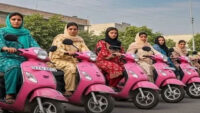India: Stressing that the Covid virus may continue to transmit for a “very long time”, senior WHO official Poonam Khetrapal Singh says the level of immunity in a community, through vaccination and previous infection, will determine whether it will become endemic in the long run.
WHO’s South-East Asia region regional director added that there is need to get to a situation where “we are fully in control of the virus, and not the virus in control of us”.
The endemic stage is when a population learns to live with a virus, very different from the epidemic stage when the virus overwhelms a population.
Populations where more people were previously infected and where vaccination coverage is high are expected to be less impacted by the virus in the future than other populations, Ms Singh told news agency PTI in an interview.
“The COVID-19 virus is expected to continue to transmit for a very long time. A multitude of factors will decide whether the virus will become endemic in the long run, chief among them is the level of immunity in a community, both through vaccination and previous infection,” she said.
On the granting of emergency use authorisation (EUA) for the indigenously developed Covaxin, she said Bharat Biotech”s dossier seeking WHO”s Emergency Use Listing (EUL) is being reviewed by technical experts and “we can expect a decision when the process is complete”.
Discussing the role of booster doses to tackle waning immunity, Singh pointed out that cases and deaths in all countries are predominantly being driven by unvaccinated people. Using vaccines for booster doses constricts supply to countries where millions are still waiting for their first dose, she said.
“Hence, WHO has called for a time-limited moratorium on COVID-19 booster doses until the end of 2021. This is to allow for at least 40 per cent of the population of each country – including those most at risk and health workers – to be vaccinated. We must remember that no one is safe till everyone is safe.”
She said there is currently no conclusive evidence that COVID-19 vaccine efficacy against severe disease and death wanes significantly over time. The vaccines, the expert emphasised, have remained effective in preventing severe disease and death.
“However, WHO has not ruled out that boosters for some population groups may be warranted in future. WHO”s recommendations on boosters will be guided by the scientific evidence, which is still evolving,” she said.
“To make a recommendation on the use of booster doses for the general population, more data is needed on optimal timing, safety and dosage of booster doses, which may differ between vaccine products. More extensive research is needed to study the effect of booster doses in the body.”
According to Ms Singh, eradication is unlikely but what we can do is to prevent or minimise deaths, hospitalisations, tragedy and social, economic and health loss due to this pandemic.
Current evidence, she said, shows that protection levels around the world remain low and most people continue to be susceptible to the virus.






